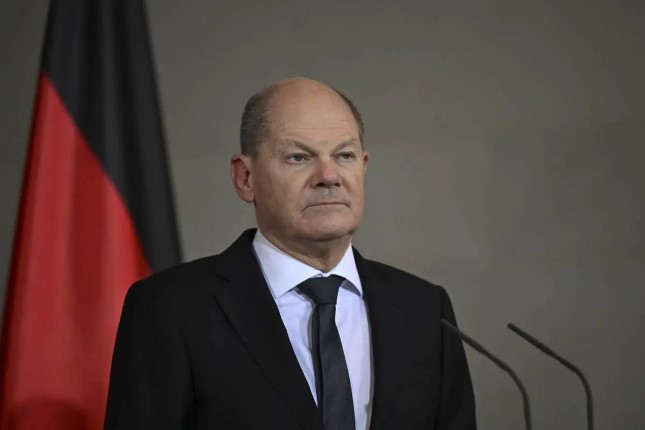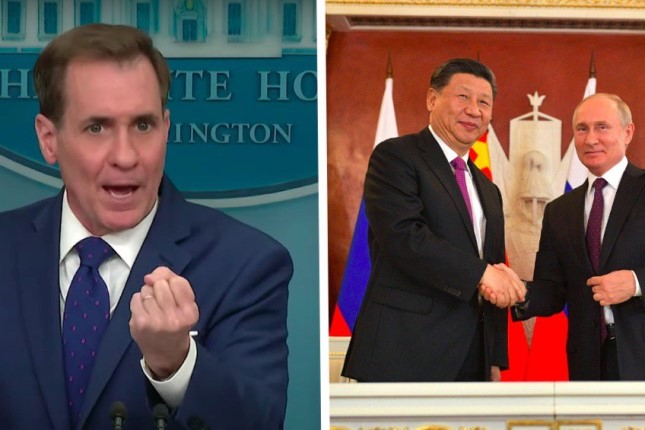The removal of House of Representatives Speaker Kevin McCarthy on Tuesday comes amidst and reflects an interconnected series of crises in the United States. There is a developing economic crisis, with mounting worries over the precarious global position of the dollar. The political system is highly unstable and increasingly dysfunctional in advance of the 2024 elections. The extreme growth of social inequality has created the conditions for the most significant strike movement since the 1970s, which the trade union apparatus is seeking desperately to control.
What brought everything to a head, however, is the escalating US-NATO war against Russia over Ukraine following the debacle of the “spring offensive.”
This is clear in a review of the background of the unprecedented events that transpired on Tuesday, when McCarthy was ousted in a 216-210 “motion to vacate” vote—the first time a House Speaker was brought down in this way.
Late Saturday night, September 30, Biden signed into law a bipartisan continuing resolution (CR) passed in the House and Senate to finance the government and avert a shutdown for 47 days. McCarthy proposed the measure following behind-the-scenes discussions with the White House and Democrats in Congress. Critically, however, the CR did not include additional financing for Ukraine.
This was seen by the Biden administration and dominant sections of the military and political establishment, including the majority of top Republicans, particularly in the Senate, as a major setback and embarrassment. Over the weekend, Biden declared that he had made a deal with McCarthy that would ensure passage of the additional money for the war. McCarthy, while declaring his own support for massive military expenditures, repudiated suggestions that any definite arrangement had been made with the White House.
Then, on Tuesday afternoon, the Pentagon issued a statement, prior to the vote to oust McCarthy, declaring that “we need Congress to act to ensure there is no disruption in our support, especially as the department seeks to replenish our stocks.”
The same day, and also prior to the vote, Biden held an extraordinary call involving the heads of NATO, the European Commission, the European Council and the leaders of Canada, Germany, Poland, Romania, Britain and France, to assure them that the United States remains committed to a massive escalation of the conflict.
According to White House national security spokesperson John Kirby, Biden “made clear [in the call] we cannot, under any circumstances, allow America’s support for Ukraine to be interrupted.” This includes not only the funding that was excluded from the CR, but also tens of billions in additional military equipment as the US escalates the conflict with Russia by sending long-range missiles, tanks and fighter jets.
Amidst these developments, there were increasingly worried statements in the press on the impact of the political crisis on US war plans. To cite just one example, Robert Gates, former defense secretary under both Bush and Obama, worried in a headline in Foreign Affairs, “The Dysfunctional Superpower: Can a Divided America Deter China and Russia?” In particular, there are bitter divisions in the Republican Party over Ukraine—not over support for imperialism, of course, but where the priorities lie.
Then came the events of Tuesday evening. The “motion to vacate” had been called Monday by the fascistic Republican Representative Matt Gaetz, a close ally of Trump. He took advantage of a rule change initiated when McCarthy was first elected nine months ago, allowing any individual representative to compel a vote on removing the Speaker. He was, however, joined by only seven other Republican representatives, three of whom have endorsed Trump.
The remaining 208 votes were provided by the Democrats, who voted as a block to support the motion. The Democrats could have stopped the removal of McCarthy by having some of its members either vote against the resolution or not attend the vote. In the days preceding the Tuesday afternoon session, the Democrats had given mixed signals about their intentions if and when Gaetz advanced his motion.
The decision to vote for the motion to vacate was not motivated by opposition to McCarthy and the right-wing agenda of the Republican leadership. Rather, the Democrats hoped that, to the extent they can influence the procedure to replace McCarthy, it will create an opportunity to restructure political arrangements in the House to ensure that nothing can delay or hinder funding for the war.
The New York Times laid this out clearly in its editorial on Wednesday, headlined, “Why is the Public’s Business at the Mercy of a Few Extremists?” The Times wrote that any new Speaker “should … commit to plain dealing with Democratic colleagues and may need them to prevent another putsch.”
Once a new Speaker is in place, the Times continued, there will be less than 40 days before the continuing resolution expires and there is another showdown over government funding. At that point, “members of good will in both parties will again need to show that they are willing and able to compromise; the Democrats could permit more spending on border security, and Republicans should continue the vital flow of aid to Ukraine.”
In other words, the Democrats, speaking through the Times, are pledging to collaborate with the domestic agenda of the Republicans in exchange for guarantees that funding for Ukraine is untouchable. The Democrats have no problem working with fascists in the Republican Party; after all, they are in alliance with fascists in Ukraine. The Times added, for good measure, that some agreement is necessary in a bipartisan manner to address the “sustainability of the social safety net”—that is, implement massive cuts in social programs.
Reinforcing the absolute centrality of the Ukraine war in all its political calculations, Biden announced on Wednesday that he will soon deliver a “major” speech on the war, with the aim of convincing the American people that “it’s critically important for the United States and our allies that we keep our commitment.” Beyond the massive escalating of funding and arms shipments to Ukraine, the administration is planning a far more direct involvement in the war, including the deployment of US-NATO troops.
The conflict within the state apparatus is not a battle between “left” and “right.” All factions of the ruling class are pursuing an absolutely reactionary agenda. The Republican Party is being transformed into a fascist party, openly defending those who attacked the Capitol on January 6, 2021 while advocating massive social cuts and militarism. The Democratic Party has embraced as its central concern a war against Russia which increasingly poses the risk of a nuclear World War III.
Photo: Rep. Kevin McCarthy, Republican-California, leaves the House floor in the US Capitol after being ousted as Speaker of the House, Tuesday, October 3, 2023 © AP Photo / J. Scott Applewhite.
Source: World Socialist Web Site.
































